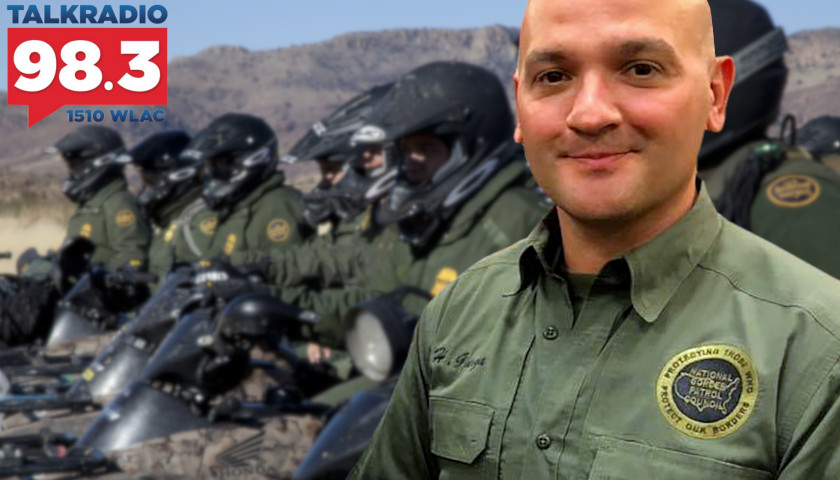On Thursday’s Tennessee Star Report with Michael Patrick Leahy – broadcast on Nashville’s Talk Radio 98.3 and 1510 WLAC weekdays from 5:00 am to 8:00 am – host Leahy welcomed Vice President of the National Border Patrol Council, Hector Garza to the show on radio row to talk about what kinds of problems border patrol agents face.
Nearing the end of the third segment, Garza explained how things have dramatically changed for the better since the Trump administration took over by citing more support for his agents. He also noted that border patrol agents are a staple in the border city communities which was what inspired him to pursue a career in the field.
Leahy: We are joined now by Hector Garza who’s the National Vice President of the National Border Patrol Council. Welcome, Hector.
Garza: Well good morning Michael, thank you for having me.
Leahy: So tell us what is the National Border Patrol Council?
Garza: So the National Border Control Council is the organization that represents the men and women of the US border patrol. We’re the organization that advocates for them but also advocates for border security with members of Congress.
Leahy: Being on the border patrol has got to be one of the toughest jobs in the country and it’s getting tougher it seems to me.
Garza: Well, there’s definitely a lot of challenges with border security. It’s always a hot topic. Depending on the political climate that’s how our resources will work with US border patrol. We do know that under the Obama administration a lot of our resources were taken away and now thank God because of President Trump that has changed for the best now.
Leahy: I was going to tell you I have a personal connection to the border patrol. My cousin spent his career in the border patrol. He retired I think, about eight or nine years ago. He was down in the Nogales, Texas and in El Paso and all along the border. And I recall him telling me 10 years ago what a tough job it was. I think he’s glad to be retired to be honest with you.
Garza: Yes, it’s definitely a tough job. A lot of people ask me why sometimes the border patrol has a problem with retention. And mainly the job of a border patrol agent is a very difficult one. We work in remote locations. Like in ranches out in the deserts with little to no back up out there. Sometimes we have radios that don’t function properly.
Leahy: Why do the radio’s not function properly? This is the United State government. Shouldn’t they be providing you with the very best radios that work?
Garza: Well when you think about our soldiers out in Afghanistan, they have radios that work. Unfortunately, I think the federal government just has not allocated the proper funding and resources to our agency. I think under the Obama administration that was a big problem where the investments were not made. And I think now under the Trump administration that we’re barely trying to catch up.
Leahy: So how many border patrol agents are there roughly?
Garza: So we have about 19,000 border patrol agents nationwide. We do have a congressional mandate of having 21,370 border patrol agents. Unfortunately for the past 10 years, we have not been able to meet that mandate.
Leahy: Is that because you’re not able to get enough qualified candidates for the jobs?
Garza: No, so I think what ends up happening is that the job of a border patrol agent is very difficult. As I mentioned, we work in remote locations. Little to no backup. Working in the border areas is very difficult. You get somebody from Pennsylvania or somebody for example from Tennessee going to work down on the border…
Leahy: The southern border.
Garza: Unfortunately, the education system is not the best on the border. The healthcare system is also not the best.
Leahy: So if they have kids that is a concern?
Garza: Of course. And also for that spouse. Maybe that spouse does not speak the Spanish language and it will be difficult for that spouse to get that job on the border. So it’s just very difficult. And then you pair up the attacks on border patrol agents from like members of Congress and the fake news media. Yesh, that makes it very very difficult.
Leahy: How many of those 19,000 border patrol agents are on the southern border between Texas and New Mexico, Arizona, and California? And how many are on the northern border with Canada?
Garza: We have about maybe 5,000 border patrol agents on the northern border and the remaining are on the southern border are the majority of our resources are concentrated on the southern border because of the traffic we get there.
Leahy: It’s interesting because I went back in July, my dad was born on a farm in Hemingford, Quebec which is just about three miles north of the border update New York. And so I went back to visit it over the summer and I went through one of these little border crossings.
(Whispers) A little side area that nobody knows about and I went in. There was no line. One guy. Very nice and was very thorough. My sense is that’s a little different experience than you might have on the southern border.
Garza: Yes. As border patrol agents, our job is to patrol between the ports of entry. That’s the job of the border patrol agent. But also as border patrol agents we also operate and man the border patrol immigration checkpoints. Those are the checkpoints that are stationed as we leave the border area.
Leahy: So if there’s the distance between El Paso and Sunland, New Mexico maybe there’s a five-mile gap there or a 20-mile gap? That border is where the border patrol guys are patrolling.
Garza: Correct. That is the border patrol. Many times our border patrol agents get confused with the CBP officers. Those are the Customs and Border Protection officers that actually work at the ports of entry. Those are the legal ports of entry where people are supposed to come in if they wish to enter the country. Border patrol agents actually operate between those ports of entry and that’s where people come in when they seek to enter the country illegally.
Leahy: So a separate entity actually processing people at the points of entry?
Garza: That’s correct.
Garza: And those folks are called CBP officers.
Leahy: Got it. CBP officers.
Garza: And just so you know Michael, border patrol also falls under CBP but that’s not our function to work at the ports of entry.
Leahy: Got it.
Garza: That’s why the work of a border patrol agent is very difficult. Because you’re working in the middle of the desert in rach lands.
Leahy: Oh man. It’s hot.
Garza: Very little infrastructure. Very little technology. And it’s difficult when you’re dealing with drug cartels, human smugglers and child traffickers. That makes it a very difficult job. If you think about law enforcement or your typical sheriff or police officer in the city. They have a lot of infrastructure and a lot of technology with radio towers. It’s not the same thing for a border patrol agent.
Leahy: Exactly. That’s very interesting. Hector, tell us how you got involved in this. Where you’re from and how did you decide this would be your career?
Garza: I was raised in the borderland. I was actually born in Houston, Texas. But I was raised in Laredo.
Leahy: I have been to Laredo.
Garza: Interesting. Wow.
Leahy: I have been to Laredo. I had a long time ago I was in business with somebody who actually lived down in Laredo and it was actually a media business. But they lived in Laredo. So I went down and visited Laredo. Saw Laredo and drove southeast to get to McAllen. So I know Laredo. I wouldn’t say I know it well but I have a distinct memory of it.
Garza: Very interesting.
Leahy: So you grew up in Laredo?
Garza: Yeah, so Laredo, Texas is on the southern border. And it’s located in south Texas. If you think about San Antonio Texas home of the San Antonio Spurs, we’re about a two-hour drive south of San Antonio.
Leahy: Isn’t right across the city typically across the border is it Nuevo Laredo?
Garza: Nuevo Laredo.
Leahy: The Mexican city.
Garza: It’s very similar to what El Paso has with that Laredo Juarez. You have two cities sitting right on the border and that’s what makes Laredo very unique. That it has that border town right across Laredo.
Leahy: Did you go to Laredo high school and play football for the Laredo Raiders?
Garza: As a matter of fact, I went to school in Laredo and I did play football.
Leahy: Yeah, of course, you did. I can tell. Now hold on. I’m guessing you were a half back?
Garza: I was a defensive end.
Leahy: Defensive end ok.
Garza: I was one of the tougher guys.
Leahy: A muscle guy. (Laughter)
Garza: So Michael, (Leahy laughs) being raised on the border, the US border patrol plays a very active role in our community. Growing up in Laredo growing through elementary, middle school, and high school. The border patrol will go out to those high schools and elementary schools and provide presentations to the students. They provide drug awareness presentations.
Human smuggling presentations. And the border patrol plays a very active role in the community. So if you see your typical air shows and the typical fairs that you have in the community, the border patrol participates in those. They have a very active role in engaging the community. So being raised on the border, I always had the knowledge of the border and what they did.
But as I grew up I started seeing there was a serious issue with illegal immigration and drug smuggling. I remember a lot of my classmates would get in trouble because they’d get caught smuggling drugs over the border. So that’s how became involved.
Listen to the full hour:
– – –
Tune in weekdays from 5:00 – 8:00 am to the Tennessee Star Report with Michael Patrick Leahy on Talk Radio 98.3 FM WLAC 1510. Listen online at iHeart Radio.
Photo “Hector Garza” by Hector Garza.





